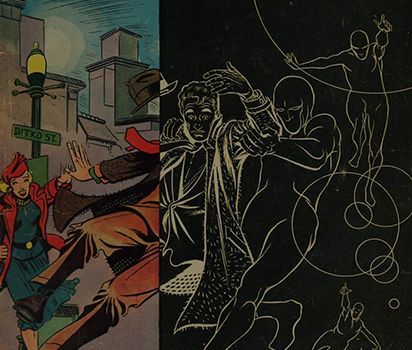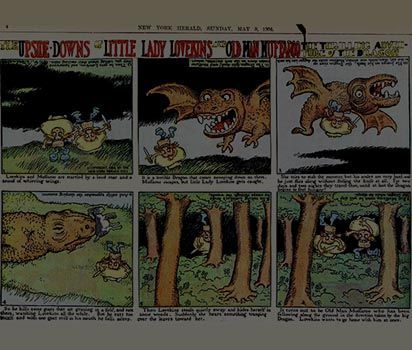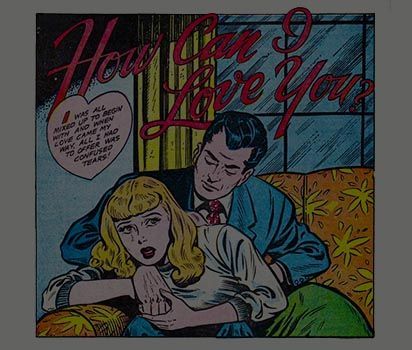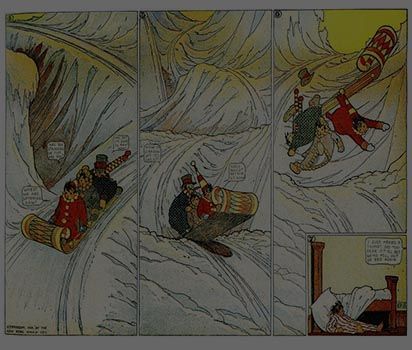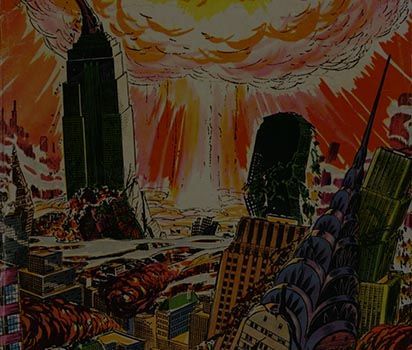EVENTS > CONFERENCES > 2024 > FRAMING THE UNREAL
Seminars
Full list of seminars.
Seminar 01 - Comics Multiverses
Organizer: David Coughlan
The concept of the multiverse dates back to ancient Greek philosophy, and it entered modern scientific debate in 1895, as Milan M. Ćirković outlines in The Oxford Handbook of the History of Modern Cosmology. Some argue, however, as Paul Davies does in "A Brief History of the Multiverse," that the idea of the multiverse is unverifiable as science fact and will forever remain science fiction. In comics, the multiverse was famously realised in "Flash of Two Worlds!" in The Flash #123 (Sept. 1961), which introduced Earth-Two. Since then, the multiverse has been a core aspect of DC Comics history, and it is as important to Marvel Comics and the Marvel Cinematic Universe, which is engaged in "The Multiverse Saga."
This panel will discuss comics multiverses, with a focus on the fact that, as Ćirković states, "The multiverse represents a triumph of diversity." It is hoped that the panel will explore the ways in which comics multiverses do or do not represent diverse identities, selves, voices, histories, realities, or what ifs, though a multitude of other approaches would also be welcome. Possible topics include:
● Possible worlds and possible worldviews
● Contrast and continuity in universe construction
● Alternate histories and timelines
● Crises and events
● Drawing parallel realities
● The multiverse as publication strategy
●
Multiverse fatigue
● Details will be shared soon
Seminar language: English.
Chair: David Coughlan, david.coughlan@ul.ie.
Seminar 02 - Gender in Science Fiction Comics and Graphic Novels
Organizers: Lisa DeTora, Alison Halsall
Science fiction has often been criticized as normalizing and reinforcing dominant hegemonies, encouraging depictions of sexualized violence, and/or eliding or demonizing LGBTQ+ identities. Comics and graphic narratives, on the other hand, have provided an important platform for representing various kinds of embodied identities in word and image. This panel considers how feminist and LGBTQ+ comics and characters interact and intersect with science fictions, broadly imagined. At stake in these conversations are the particular narrative and formal affordances of comics and graphic narratives and how they might constrain or expand possibilities for representation. Some of the questions that this panel looks to investigate include:
● What is it about science fiction (its generic and visual attributes) that preoccupies comics creators in their construction(s) of gender?
● What insights do contemporary graphic texts provide about gender in science fiction?
We are soliciting papers that address these questions against the greater context of the conference topic of “Framing the Unreal.”
● Details will be shared soon
Seminar language: English.
Chairs: Lisa DeTora, lisa.m.detora@hofstra.edu, Alison Halsall, ahalsall@yorku.ca.
Seminar 03 - Framing Future Wars: SF/F War Comics
Organizer: Umberto Rossi
Steffen Hantke maintained that “Science fiction is at its most American when it addresses military themes”. But what about science fiction comics? One may of course think of the origins of such an iconic character as Marvel’s Captain America, who started his career fighting the evil Nazi supervillain Red Skull and the armies of the Third Reich; but well before that, the adventures of Buck Rogers begin in 2429 AD, when the Mongol Reds have just defeated the USA; there are wars also in another classic of early graphic SF, Flash Gordon; and the Third World War looms large on two recent masterpieces of the sequential art, that is, Alan Moore’s V for Vendetta and Watchmen, both with a strong SFnal component. Then we have a typical form of futuristic (or retro-futuristic) war, the alien invasion, to be found in Moore’s rewriting of H.G. Well’s The War of the Worlds in the second part of his League of the Extraordinary Gentlemen, as well as in Oesterheld and Breccia’s El Eternauta.
This panel aims at discussing how future/interplanetary/uchronic wars have been written and drawn by comics artists from all over planet Earth, and question Hantke’s statements to ascertain whether military themes are an American specialty (or obsession) also when they are framed in SF/F comics.
● Details will be shared soon
Seminar language: English.
Chair: Umberto Rossi, scardanelli15@gmail.com.
Seminar 04 -
El Eternauta, the Masterpiece of Argentine Comics
Organizers: Francisco Saez de Adana, Angelo Piepoli
If we talk about Argentine comics, El Eternauta immediately comes to mind. The work created by the writer Héctor Germán Oesterheld and the cartoonist Francisco Solano López was serialized between 1957 and 1959 in the magazine Hora Cero Semanal and, from the sixties onwards, it began to appear compiled in books in various editions that have kept its presence in the market to this day, being considered one of the most important Spanish-speaking comics in history. In addition, the work has had an international repercussion, being translated into several languages, and has even recently been published in the United States by the well-known independent publisher Fantagraphics.
There are several issues that make this work a milestone in Argentine comics. Above all, its pioneering character as a science fiction work whose setting is Argentina itself, specifically the city of Buenos Aires, something that was not very common at that time where stories of this type usually took place in American cities. This allowed Oesterheld to reflect on the reality of his country, pouring some of his political ideas.
Precisely the political question is also of great relevance. The fact that Oesterheld was assassinated by the military dictatorship in 1978 gave new meanings to a work, whose political use increased since 2009, when some Peronist political groups linked to Kirchnerism used the image of the Eternauta linked to the figure of former President Néstor Kirchner and merged them into a character called "El Nestornauta", which was used as a symbol of these groups under the support of Oesterheld's widow.
For this reason, the organizers of this panel consider that there should be a space for debate dedicated specifically to the character, a seminar where comic scholars can discuss his long and complex history from different points of view and fields of research, such as political studies, the history of Argentina since the 1950s, media and popular culture studies, semiotics and comparative literature, and, last but not least, comics studies.
● Details will be shared soon
Seminar language: Spanish.
Chair: Francisco Saez de Adana, kiko.saez@uah.es.
Seminar 05 - Beyond the Frame: Perspectives of Comics Studies on SFF
Proposed by the Conference Organizing Committee
Comics Studies benefit from the application of diverse disciplines, theoretical approaches and methodological frameworks to the study of comics and graphic narrative. So, what happens when, for example, narratology, genre theory and medical humanities are used to analyze SFF comics?
This seminar features presentations adopting diverse interpretive strategies that may help us come to terms with science-fiction and fantasy comics. At the same time, all adopted branches of knowledge may benefit from trying to frame non-realistic sequential narratives.
● Details will be shared soon
Seminar language: English.
Chair: Kai Mikkonen, kai.mikkonen@helsinki.fi.
Seminar 06 - The Theme of the Invasion in Fantastic, Fantasy and Science-Fiction Comics
Organizer: Davide Carnevale
The concept of "invasion" describes one of the constitutive dynamics of a fantastic narrative, a delicate diegetic mechanism aimed in all its parts at outlining an otherness which is impossible to place in the plane of ordinary reality; but it also refers to a series of central themes and motifs of fantasy and science fiction. Consider, for instance, the importance that the theme of the alien invasion has in science fiction literature, playing a central role since the first confrontation between Mars and the British Empire in H. G. Wells’ The War of the Worlds (1898), up to such recent novels as Ted Chiang’s Story of Your Life (1998) and Liu Cixin’s The Three-Body Problem (2006), which re-elaborate the classic elements of this narrative device in an original way. The presence of the theme within the varied repertoire of fantasy literature is equally significant. Many of its most representative works unfold (often in a hypertrophic way) around a narrative core consisting of the story of the strenuous opposition to an invasion by a small handful of heroes, at the basis of the Manichean opposition between good and evil that characterizes the genre. Even Tolkien's masterpiece, The Lord of the Rings (1955), can be summed up in a nutshell as the story of the resistance of the free peoples of Middle-earth to the expansionist aims of the tyrant Sauron, just as David Gemmell's seminal novel Legend (1984) rewrites the historical episode of Thermopylae. Even the intricate events that animate the novels of George R. Martin's saga A Song of Ice and Fire take place against the backdrop of a looming external threat.
The theme of invasion retains its centrality, as is to be expected, even in the field of fantasy and science fiction comics, be they adaptations of literary texts, or—more interestingly—genuinely original works capable of re-elaborating the stylistic features of the two genres, such as
Nameless (2016) by Grant Morrison, an unsettling sci-fi reinterpretation of Lovecraftian cosmic horror, or
Lake of Fire (2016) by Nathan Fairbairn and Matt Smith, which projects the motif of alien aggression onto a medieval setting. The panel aims to explore the forms that invasion assumes in fantastic, fantasy, and science fiction comics, by analysing its modes of representation within the two different dimensions of comic language, verbal and figurative, and investigating the role that contrastive dynamics play at a narrative level in works belonging to these genres.
● Details will be shared soon
Seminar languages: English, Spanish.
Chair: Davide Carnevale, davide.carnevale@uniroma1.it.
Seminar 07 -
The Weird Western in Transnational Comics
Organizer: Marek Paryż
The weird Western is a hybrid genre that combines the Western with different genres of the fantastic, such as science fiction, fantasy, horror, or the Gothic. It has a long history, dating back at least to the era of pulp magazines, but it has only recently attracted critical attentions, and the body of scholarship on weird Westerns has been steadily growing. Comics have played a key role in defining and popularizing this genre, but the existing criticism on the subject largely overlooks them. This is particularly true of weird Westerns in transnational comics; in cultures outside the U.S. weird Western comic books exist in niches, they may have cult following, but they seldom reach bigger readerships.
Our panel will discuss examples of weird Western comics created in Poland, Germany, and Argentina (presentations on works with different origins are welcome) with the aim of proposing a more systematic approach to the phenomenon. Transnational weird Western comic books employ a range of conventions that are at the same rime universally recognizable and culturally specific in varying degrees. They typically use defamiliarizing strategies, often quite sophisticated, but they also tend to abound in references that anchor them in the contexts that produced them.
● Details will be shared soon
Seminar language: English.
Chair: Marek Paryż, m.a.paryz@uw.edu.pl.
Seminar 08 - Horror SFF Comics
Organizer: Stefan Buchenberger
In comic books, horror has also played a major role. From its heyday in the 1940s and 50s to attempts to censor the whole genre, the following horror comics revival, DC’s Vertigo Comics as a trailblazer for mature audiences’ comics, to modern classics like The Walking Dead.
This panel would like to propose (but is not limited to) the following topics:
● Classical horror icons in comics: Dracula, Frankenstein, and others
● Horror and Science Fiction and Fantasy: movie franchises Alien and Predator, Robert E. Howard’s archetypical fantasy hero Conan the Barbarian and Alan Moore’s adaptation of H.P. Lovecraft’s Cthulu-myth
● Movie horror icons in comics: John Carpenter’s The Thing, George A. Romero’s Zombie comics, Leatherface, Jason Vorhees, or Freddy Krueger
● Horror and Biographies: The life of notorious serial killers like Ed Gein or Jeffry Dahmer in graphic fiction
● Global perspective horror comics in Japan or Europe
● Details will be shared soon
Seminar language: English.
Chair: Stefan Buchenberger, ft101819sc@kanagawa-u.ac.jp.
Seminar 09 - Nightmares from the Past, Visions of the Future: Alternative Futurism & Comics
Organizers: Mattia Arioli, Chiara Patrizi
In sharp contrast to its origins in the proto-fascist technological enthusiasm of the early 20th Century, the term “Futurism” has been reclaimed and resignified since the 1970s by various marginal groups to imagine a new future against settler colonialism, racism, ableism, and heteronormativity. Hence, Alternative Futurisms can be seen as a militant response to contemporary discussions about race, gender, nation, and social justice. These types of futurisms often use Sci-Fi imagery, ideology, and themes to renew and recover marginal voices when envisioning a different future. Going well beyond the use of recurring Sci-Fi tropes (cyborgs, space and/or time travels, AI, etc.), these texts offer a platform for emancipatory and critical speculations. When the term Afrofuturism (the first “futurism” to be studied) was coined by Mark Dery in 1994, the scholar noticed how Sci-Fi was embraced in ways that celebrated diversity and presented visions of hope and future.
Even though many of these works use Utopia and Science Fiction to narrate alternate histories that might lead to a real change for the better, others portray apocalyptic scenarios where the “what-if” meets the “if-this-goes-on” (Butler, 1998), functioning as cautionary tales. As Grace L. Dillon (2012:11) observed, “Indigenous futurisms are narratives of biskaabiiyang, an Anishinaabemowin word connoting the process of ‘returning to ourselves,’ which involves discovering how personally one is affected by colonization”. These narratives often retrieve ancestral traditions to recover from post-apocalyptic scenarios caused by the contact with settlers. Here, indigenous knowledge and cosmologies dialogue with western science to show how Native practices were not “primitive” at all—even though they were not based on western taxonomies. They also denounce how often western sciences (especially anthropology) were—and in some cases still are—intertwined with colonial ideology.
The field of Alternative Futurisms is particularly culturally relevant as it spans from literature to graphic, performative, and digital arts and music. Although the phenomenon is not new (Afrofuturism dates to the 1970s), the increasing number of comics and graphic novels adopting this aesthetic is certainly a new experience. One of the reasons behind such growth might be since comics seem particularly well suited for futuristic aesthetics, as they can easily host nonlinear narratives, constantly moving into the future and back into the past. Whereas Black Panther is probably the best-known example of Afrofuturism, one can also mention the comics Is’nana the Were-Spider, inspired by African folklore, Nowhere Man, a technological crime fighter or Matty’s Rocket, in which the main protagonist embodies elements of Harriet Tubman and Bessie Coleman, but also adaptations of such classics of the genre as The Parable of the Sower. Being attuned to this heterogeneous and dynamic artistic landscape, this panel aims to discuss how mainstream and alternative comics use Futuristic aesthetics to give voice to marginal groups.
We encourage submissions that engage with, but are not limited to, the following themes:
● Afrofuturism
● Africana Futurisms
● Indigenous Futurisms
● Latinx Futurisms
● Asian (American) Futurisms
● Queer Futurisms
● Disabilities in imagined futures
Image from: wallpapers.com
● Details will be shared soon
Seminar language: English.
Chairs: Mattia Arioli, mattia.arioli2@unibo.it, Chiara Patrizi, chiara.patrizi6@unibo.it.
Seminar 10 - Speculative Histories of Race and Comics Remediation
Organizer: Qiana Whitted
This panel discusses comics adaptations of fantasy, science fiction, and horror stories that intervene in histories of racialized trauma and triumph. Recent historical comics and graphic novels have engaged with the work of writers such as Octavia Butler, Victor LaValle, and Stephen King in ways that demonstrate the pliancy of visual narrative in recovering lived Black experiences, while also providing sequential spaces where bigotry and oppression can be named, confronted, or envisioned anew.
The panel welcomes topics that take a closer look at representations of race and history through the speculative, especially submissions that highlight the role of comics in the remediation of narrative forms, techniques, and contexts from one medium to another.
● Details will be shared soon
Seminar language: English.
Chair: Qiana Whitted, whittedq@mailbox.sc.edu.
Seminar 11 - Unframing the Real: Science in SFF Comics
Organizers: Crys Clitheroe, Anna-Sophie Jürgens
How 'real' or 'unreal' is science in SFF and postapocalyptic comics? Science in graphic (science) fiction is considered a tool for drama and for tapping into the creative and speculative aspects of scientific thought. It does not have to be accurate but can be authentic. Research on science fiction as a genre and a theme in pop culture has established that popular culture wields enormous power to influence society regarding its opinion on and attitudes towards scientific topics (see e.g. the publications by science communicator David Kirby). So we are looking for papers that explore and unpack the strategies used in (science fiction) comics to shape, challenge and reimagine science, with the aim of better understanding the facets, dynamics and cultural power of science in graphic fiction (including comics adaptations).
Some Ideas:
● Cultural representations of science's procedures and processes produce and present an image of science that does not always have much in common with 'real' science. What can we learn from science in comics about science? In the medium of sci-fi comics, science narratives have their own persuasive truths. What are these truths?
● HazMat suits, Speedsuits and Lab coats! What is the gender and morality of the Lab coat (is it a superhero cape or a villainous coat)? Is the lab coat fashion or placebo (increasing potentials for learning, conditioning, suggestibility and catharsis)?
● Who are the comics scientists, inventors, and innovators? How do they identify? Where are they from and do their experiences, cultures and beliefs influence how they do their science and what they use it for? How do we relate to their stories?
● If science institutions in (SFF) comics are modelled after 'real life' institutions (and some of them are!), how do their narratives influence what the recipient imagines about the role, agency or authority of those institutions?
How accessible is sci-fi science to the characters in their story worlds? Is it an open-source playground or a precious resource gatekept by an authority?
●
How does the presentation of science in comics change in adaptations? For example, how does media affordance (visually and narratively) influence and frame the way a scientific concept is presented (explained, elucidated) in the film adaptation of a comic?
● Details will be shared soon
Seminar language: English.
Chairs: Crys Clitheroe, crystal-leigh.clitheroe@anu.edu.au, Anna-Sophie Jürgens, anna-sophie.jurgens@anu.edu.au.
Seminar 12 - When the Real Collapses: How Fantasy Comics Engage with the Russo-Ukrainian War
Organizers: Svitlana Stupak, Alexander James Pollard
As a detour from the real into the unreal, fantasy, however paradoxically, proves itself in reducing the distance to the reader in mediating complex histories and collective psychic sites, especially at a time, when the referential discourse fails to adequately frame a happening that is intrinsically ‘unnatural.’ The premise of this panel is to examine the ways, in which fantasy/sci-fi comics engage in a contemporary project of narrating Ukrainian postcolonial realities in the face of the Russo-Ukrainian war. Generic nature of fantasy, coupled with the medium specific properties of comics, opens up the gaps in referential discourse, in which netherlands as “emotional image[s] of the explorable spaces” arise.
We are welcoming the contributions that tackle the following questions:
● What gaps does fantasy fiction fill in the referential discourse on the war?
● How do contemporary comics feature the interplay between reality and fantasy in narrating war-related trauma?
● Why do contemporary comics authors increasingly turn to fantastical imagery in addressing highly political topics?
● Details will be shared soon
Seminar language: English.
Chairs: Svitlana Stupak, svitlana.stupak@student.uni-siegen.de, Alexander James Pollard, A.J.Pollard@brighton.ac.uk.
Seminar 13 - The Future of the Past: Nostalgia and Speculative Comics General Introduction
Organizer: Kathleen McClancy
Sci-fi and fantasy have complicated relationships with time. Sci-fi looks to the future, speculating on how the today’s technologies might shape societies to come. Fantasy looks to the past, imagining variations on our foundational mythologies. Yet both genres are ultimately about the present, and speculative fiction is less concerned with prediction or revision than with self-examination: with using the past and the future as metaphors to understand our current existence.
Comics also have a complicated relationship with time. The medial nature of comics—multiple still images in sequence, spread across a page—is simultaneously static and vectorized, and comics create time through space; the juxtaposition of panels both across recto and verso and across the many pages in a book encourage a kind of time travel for the reader, whose eyes encounter the images in ways that are not strictly linear. Comics encourage readers to time travel simply through their form.
Speculative comics thus provide an ideal vehicle for examinations of nostalgia. Nostalgia itself is a form of time travel, an attempt to return to a past already filtered through the present in order to influence the future. This panel investigates the relationship between comics, genre, and nostalgia.
● Details will be shared soon
Seminar language: English.
Chair: Kathleen McClancy, kmcclancy@txstate.edu.
Seminar 14 (Roundtable) - Race, Class, Gender, and the Environment in Latin American Science Fiction Comics
Organizer: Maria Fernanda Díaz-Basteris
This round table discussion will center contemporary science fiction comics from Latin America that embody environmental disaster images at the intersections of race and gender. The presenters will engage in a productive dialogue about, but not limited to, comics’ representations of posthuman conditions in Brazil, the post-apocalyptic world in Uruguay, and the dystopian spaces in future Argentina.
This round table proposes to think about Latin American science fiction comics and its creators along with environmental studies and gender studies across the Americas.
● Details will be shared soon
Seminar language: Spanish.
Chair: Maria Fernanda Díaz-Basteris, diaz-basteris.1@osu.edu.
Seminar 15 - From Word to Image and Back: SFF and Transmediality
Proposed by the Conference Organizing Committee
Complex transmedial phenomena have taken place when it comes to the SFF imagination, much more multifaceted than any simple concept of “adaptation” may describe. Dmitry Glukhovsky’s 2003 novel Metro 2033, set in an apocalyptic, post-nuclear holocaust future, inspired the homonymous first-person shooter videogame (2010), which in turn inspired a trilogy of novels by Italian writer Tullio Avoledo. The novels of the fantasy saga The Witcher by Polish author Andrzej Sapkowski became internationally famous after inspiring a video game series. Such successful TV series as Star Trek, Doctor Who, Stranger Things have spawned almost numberless novelizations; classic SF novels like Frank Herbert’s Dune and Isaac Asimov’s Foundation series have been repeatedly adapted for the screen; the Star Wars franchise has created iconic images (one might just mention Darth Vader) appropriated by contemporary artists; comics writers have adapted classics of SF and fantasy, sometime with remarkable changes (e.g. Alan Moore’s treatment of H.G. Wells The War of the Worlds in The League of Extraordinary Gentlemen or Alberto Breccia’s translation of H. P. Lovecraft Cthulhu Mythos); vice versa, comics such as Mike Mignola's Hellboy or Neil Gaiman's Sandman have been translated into movies, TV series and video games. Even superhero comics have long since given rise to successful expanded multimedia universes.
Last but not least, illustrations have played a very important role in the diffusion and evolution of both science-fiction and fantasy (one may consider the covers of pulp magazines and or paperback books, and the posters that advertise films). All this complex circulation of words and images needs to be charted and discussed in the context of a conference exploring the graphic/visual aspects of science-fiction and fantasy; presentations focusing on these issues will be thus welcome in a dedicated seminar.
● Details will be shared soon
Seminar language: English.
Chair: Tracy Lassiter, tlassiter@unm.edu.
Seminar 16 - Graphic Depictions of Post-Apocalyptic Visions
Proposed by the Conference Organizing Committee
The presentations in this seminar focus on how post-apocalyptic worlds are represented and explored in comics, animated feature films and videogames, and how such worlds may reflect the actual historical transformation of post-communist cityscapes, displace the anthropocentric positioning of players making them question the impact of humanity’s demise on other species, or show how problems commonly ignored in the present can become central to the not-so-distant future.
● Details will be shared soon
Seminar language: English.
Chair: Angelo Piepoli, angelo.piepoli@gmail.com.
Seminar 17 - Comics and God(s)
Proposed by the Conference Organizing Committee
This seminar deals with the role played by religion(s) in comics, illustrations, online literature, foundational science fiction theories, and basic video game design principles.
God (or gods) may be just referenced through hints and echoes, or become full-fledged characters in a graphic/visual narrative; on the other hand, religions may use illustration or comics in their propaganda, aimed at spreading their particular brand of belief.
● Details will be shared soon
Seminar language: English.
Chair: Takayuki Yokota-Murakami, yokotamurakami@fulbrightmail.org.
Seminar 18 - Posthuman, Inhuman, Transhuman
Proposed by the Conference Organizing Committee
Imagining aliens, that is, non-human or inhuman beings has been one of the missions of science-fiction since its inception; but it also attempted to picture what humankind could become thanks totechno-scientific development or evolution.
The presentations in this seminar all deal with how inhuman or posthuman/transhuman creatures have been conjured up by comics, and what concerns animate such sequential narratives, ranging from issues of ethnicity to the commodification of the human body.
● Details will be shared soon
Seminar language: English.
Chair: Barbara Grüning,
barbara.gruning@unimib.it.


